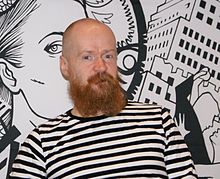Alexander Bard
| Alexander Bard | |
|---|---|
 |
|
| Background information | |
| Birth name | Alexander Bengt Magnus Bard |
| Born |
17 March 1961 Motala, Sweden |
| Genres | Pop, electronica |
| Occupation(s) | Musician, writer, lecturer |
| Associated acts | Baard, Barbie, Army of Lovers, Alcazar, Vacuum, Bodies Without Organs, Gravitonas |
| Notable instruments | |
| Synthesizers | |
Alexander Bengt Magnus Bard (born 17 March 1961) is a Swedish philosopher, songwriter, record producer, TV personality and religious and political activist.
Bard was born in Medevi, Motala Municipality, Sweden on 17 March 1961. After he completed his upper secondary education, Bard studied in the United States and in Amsterdam, Netherlands. While living in Amsterdam, he earned part of his living as a sex worker. Bard returned to Sweden to study at the from 1984 to 1989. In addition to his studies in economics, he took a strong interest in philosophy and social theory with the explicit aim of becoming a philosophy writer and lecturer. Bard has been a judge on Swedish Idol, a spin-off of Pop Idol, since 2011.
Bard has written three books on the Internet revolution, collectively known as The Futurica Trilogy, together with media theorist Jan Söderqvist. Their first collaboration The Netocrats was originally released in Swedish in 2000, became available in English in 2003, and has since been translated to a further 16 languages with total worldwide sales exceeding 340,000 copies.
The second book The Global Empire was originally released in Swedish in 2003, while the third installment of the trilogy The Body Machines was originally published in Swedish in 2009. These latter two works were released in English in 2012, completing The Futurica Trilogy, in which the authors present their philosophical vision for a global and increasingly virtual society, as a consequence of the Internet revolution. A fourth book from Bard & Söderqvist, Syntheism - Creating God in The Internet Age, was released in October 2014. The book focuses on participatory culture as the spirituality of the digital age and advocates a relationalism inspired by philosopher Alfred North Whitehead and physicist Niels Bohr as the antidote to the individualism of the collapsing capitalist age.
...
Wikipedia
